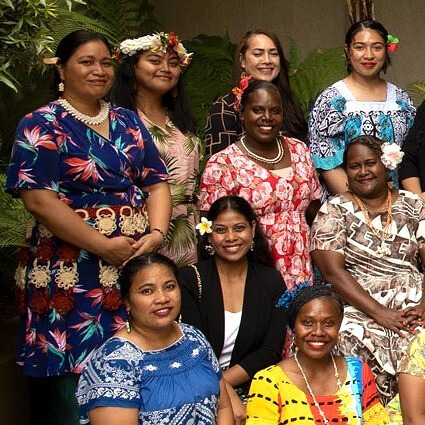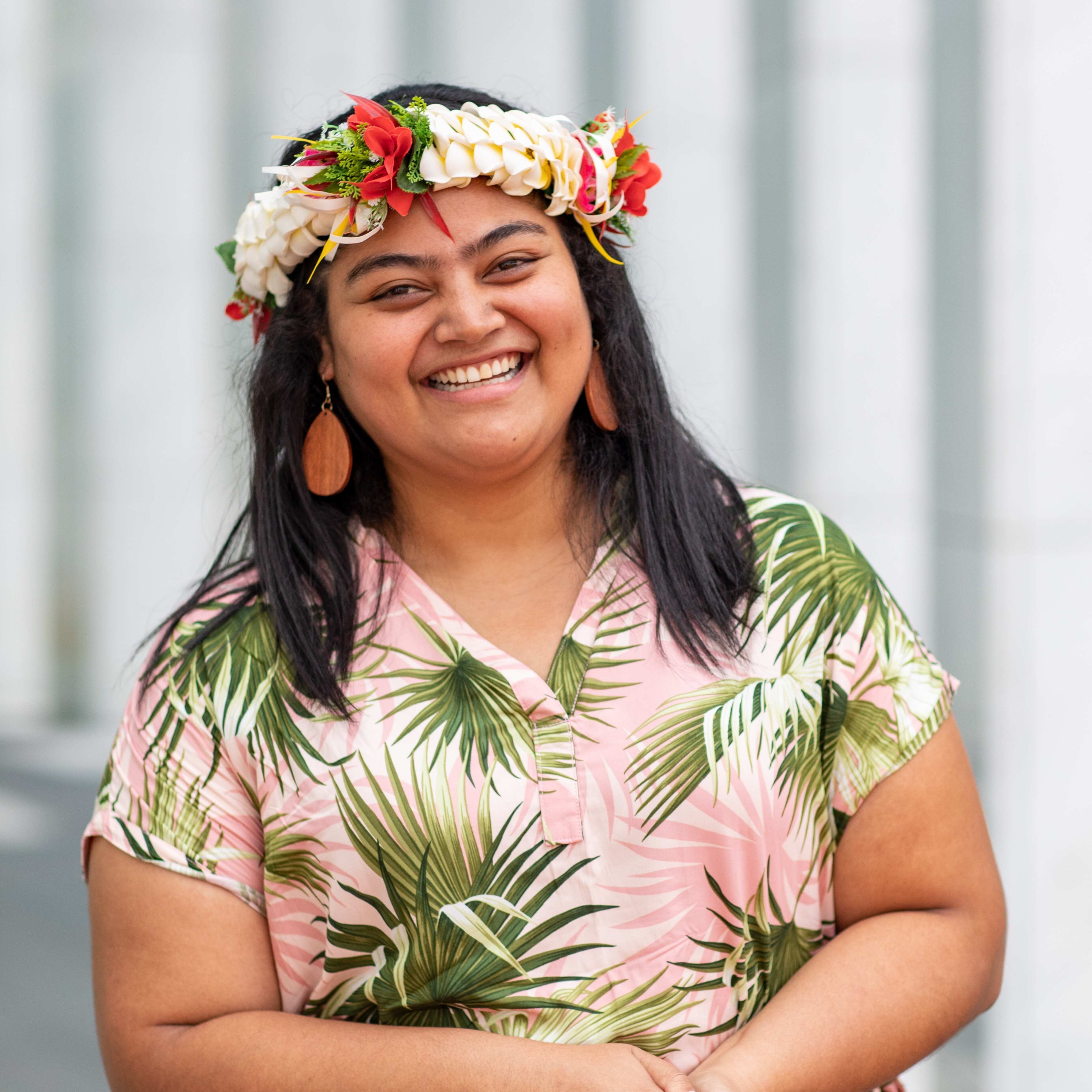
WLI alumna, Malo Tupulaga from Tuvalu, is a dietician and health advocate empowering Tuvaluans to adopt positive lifestyle habits for public health and wellbeing.
Malo trained as a dietician at Fiji National University, completing practical placements in both Fiji and Tuvalu. After graduating with a Bachelor of Dietetics and Nutrition, she worked at Princess Margaret Hospital in Tuvalu as a dietician for Tuvalu’s Ministry of Health, Social Welfare and Gender Affairs. With a focus on clinical and food service to prevent and manage non-communicable disease (NCD), Malo worked holistically with healthcare colleagues to improve patient outcomes through dietary management and wellbeing intervention. She also contributed to public outreach programs that she believes are vital to the uptake of lifestyle-related disease prevention strategies in local communities in Tuvalu.
“The opportunity to work in the health sector and help people had been a long-standing interest of mine and this experience gave me hands-on exposure to clinical nutrition, community health and food service management, shaping my understanding of the challenges and opportunities in improving nutrition and health outcomes in the islands,” says Malo.
Having chosen to further her professional skills and knowledge overseas, Malo left Tuvalu to undertake a Master of Nutrition and Population Health at Deakin University. Reflecting on why she chose to further her studies in Australia, Malo’s commitment to improving health outcomes in Tuvalu was clearly a driving force.
“I saw Australia as a country with advanced health services, particularly in nutrition, and strengthening my knowledge and skills so I could contribute more effectively to improving nutrition in my home country was a key motivator for me,” explains Malo.
Another valuable aspect of studying at Deakin University for Malo was how it sparked an interest in policy practices, systems thinking and health prevention approaches. “I soon came to understand that lasting impact requires more than individual solutions or interventions, it requires creating supportive systems and policies that enable healthy choices at a population level.”

WLI’s strong sense of connection
As a WLI alumna, Malo credits the program for providing her with a huge amount of support and a wide network of likeminded individuals.
“WLI played a significant role in supporting my journey, and the opportunity to connect with people from across the Pacific who share similar mindsets and common goals has been invaluable. Being part of this network of such inspiring women has given me so much confidence, not just within the program but also in the classroom, during talks, and on social media,” says Malo.
“In fact recently, I stepped out of my comfort zone by sharing my views [on LinkedIn, see Malo’s post here and below] on global food systems. Reading stories about other WLI alumni really inspired me and reminded me that I, too, have a voice and can make an impact.”
Malo finds her voice
“Today in class, we were deep in conversation about global food systems — policies, interventions, sustainability. The questions were big and bold: How do we feed the world better? Where do we step in to fix what’s broken?
But as everyone spoke about countries far and wide, my mind wandered…home. To Tuvalu.
Yes, we’ve survived. Our people are resilient. But I find myself asking—what are we surviving on? And at what cost?
Our diets have slowly shifted from the foods of our ancestors to what ships can carry. Lamb necks. Lamb flaps. Turkey tails. Tinned corned beef. Highly processed, salt-laden, calorie-dense items that, in some places, are rejected scraps. But on our islands? They’re meals. They’re celebrations. They’ve become tradition—but only because real tradition has become harder to access.
And it’s easy to look at the shops and blame them. But they’re just doing what they can. Import what’s affordable. Stock what’s available. The truth is, this is bigger than one seller or one shipment. This is about a food system—one that was never designed for island nations like ours.
We are fighting two battles. One against climate change. And another, quieter one, against a food system that’s slowly stripping us of health, culture, and control. Yes, we’ve started making moves. Taxes on ultra-processed foods. Local farming efforts, like the ones supported by department of Agriculture and allies like Taiwan, are growing greens and vegetables for the community. And I’m grateful for that progress.
But is it enough? Not yet. That’s why people still turn to shops for vegetables shipped from overseas. That’s why imported, nutrient-poor food fills so many plates. Because local food isn’t always available. And when it is, it’s not always accessible.
So how do we speak to those in power? How do we explain that food isn’t just about calories—it’s about sovereignty? About culture? About survival? Today’s class shook something in me. It reminded me why I’m here. Why I’ve come all this way to study and learn. Not just for a degree. But so I can return home and work to rebuild a system that feeds our people—truly feeds them—with nutrition, dignity, and identity.
I want my children to grow up knowing the taste of traditional foods. Real foods. I want them to learn how to grow what we eat, not just unbox it. I want them to live in a Tuvalu that doesn’t depend on the leftovers of the world, but thrives on the richness of its own land and knowledge. This is why this matters. This is why food system transformation is imperative and planetary boundaries should exist!” – Malo Tupulaga

True leadership in the Pacific
Malo’s beautifully articulated thoughts on Tuvalu’s food system has been met with only positive feedback, including from fellow WLI alumni. For Malo, the support shown by her WLI network means a lot to her.
“What I value most about being part of WLI’s network is the incredible support we show one another along the way. Back home, there is a saying that true leadership is earned by winning the hearts of the people. This is gained by giving back to the community, to serve and demonstrate genuine care for their needs. One important lesson I have learned from WLI is that leadership does not always mean holding a managerial title. Rather, it is about developing skills that set you apart – being able to listen to others, communicate effectively, have a clear vision, be humble, and most importantly, have a big heart for the people you serve,” says Malo.
Malo’s vision for Tuvalu
When asked about her future hopes for Tuvalu, Malo is both pragmatic and hopeful.
“Tuvalu is already on the frontline of climate change. We are also facing a quiet fight in terms of nutrition, health and food security. My vision for Tuvalu is to build a healthier, more resilient nation by expanding people’s knowledge of the food environment, planetary boundaries, nutrition and sustainability. I see these not as isolated challenges, but as part of a complex adaptive system where climate, food systems, community behaviors and policies constantly interact,” says Malo.
“The idea that real and lasting change comes from working together – especially involving vulnerable groups and local communities – has deeply influenced how I approach leadership and problem-solving. Knowing that I have other women and men from across the Pacific to collaborate with gives me confidence that together we can create impactful change.”
